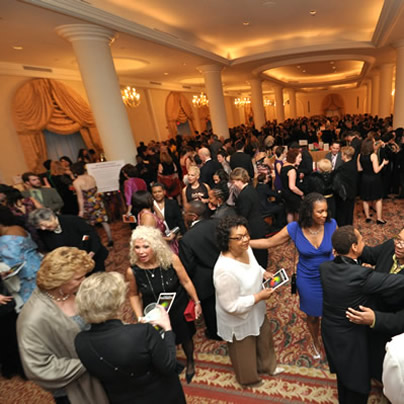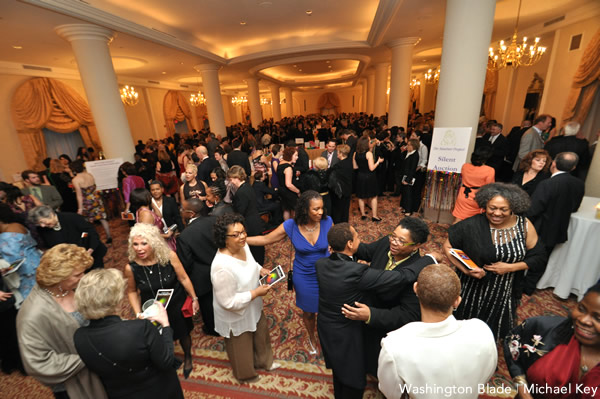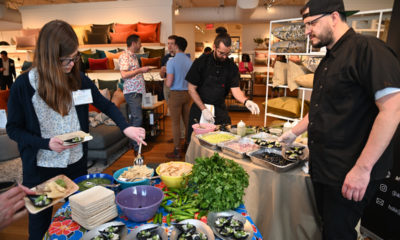Arts & Entertainment
Night out for the cause
Region’s advocacy groups have spring galas planned


2012 Mautner Project Gala (Washington Blade file photo by Michael Key)
Several local LGBT groups have their biggest events of the year in the coming weeks. Some of the galas planned include:
Mautner Project’s Gala and Dance takes place on Saturday at 5:45 p.m. at the Omni Shoreham Hotel (2500 Calvert St., NW). The Gala is to celebrate 23 years of support and community. The evening will include both a live and silent auction, a reception and a dinner by the Electric Rainbow Dance Party. Lesbian comedian Suzanne Westenhoefer will emcee. Tickets are $225. Attendees can sponsor the event by donating $600-$20,000. Attendees who would like to start the party early can purchase VIP reception tickets for $50. The reception begins at 5 p.m. For more information, visit gala.mautnerproject.org. Maryland Del. Maggie McIntosh is slated to receive an award. Look for an appearance from Maryland Gov. Martin O’Malley as well.
McIntosh told the Blade’s Michael Lavers in an interview last week that she’s optimistic about Senate Bill 449, a transgender rights bill before the Senate Judicial Proceedings Committee. “The House has passed it before, I think it’s a fairly easy pass in the House,” she said. “Wherever Equality Maryland and Sen. [Rich] Madaleno point us, we go.”
Outserve-SLDN hosts its 2013 national dinner to honor the nation’s LGBT service members, veterans and their families also on Saturday evening at 6:30 p.m. at the National Building Museum (401 F St., NW). The evening starts with a cocktail reception with the dinner beginning at 7:30 p.m. This is a black tie, military or semi-formal event and valet parking will be available. Tickets are $100-$2,500. For more information, visit sldn.org.
Equality Virginia has its 10th annual Commonwealth Dinner at the Greater Richmond Convention Center (403 North Third St., Richmond) on April 6 at 6 p.m. The dinner is the largest black-tie gala gathering for Virginia’s LGBT community. The evening will be full of live entertainment from noted invitees, a silent auction and a chance to win prizes while bidding on weekend getaways, dinners out and other prizes. The evening’s special guest is Newark Mayor Cory Booker, a rising political star who is known for his longtime support of LGBT equality. Tickets are $125 and VIP tickets are $250. For more information, visit equlityvirginia.org.
Team D.C. hosts SportsFest on April 11 at Room & Board (1840 14th St., N.W.). The evening provides attendees with the opportunity to learn about all the opportunities the Washington region has to offer in terms of LGBT sports and recreational activities. A $10 donation gets three drink tickets plus other great surprises. One of the new clubs that will be featured at the event is the D.C. Triathlon Club, a new club from the area. The event is free. For more information, visit teamdcsports.com.
Whitman-Walker Health holds its fundraising event “Be the Care” cocktail reception and awards presentation to benefit the organization on April 18 at 6:30 p.m. at the National Museum of Women in the Arts (1250 New York Ave., NW). The dinner helps Whitman-Walker provide heath services to the community. Attendees are expected to dress in business attire. Individual tickets are $150 and emerging leader event tickets are $75. For more information, visit whitman-walker.org.
Capital Area Gay and Lesbian Chamber of Commerce holds its 2013 annual awards dinner on April 19 at 6:30 p.m. at the historic Mayflower Renaissance (1127 Connecticut Ave., NW). The dinner will honor exceptional business leaders and showcase the achievement and impact of LGBT business in the Washington region. Attendees are asked to buy their tickets before March 22. Tickets are $175- $465. For more information, visit caglcc.org.
Gay and Lesbian Activists Alliance of Washington hosts its 42nd anniversary reception at the Washington Plaza Hotel (10 Thomas Circle, NW) on April 25 from 6:30-9 p.m. The evening will feature a presentation of the 2013 Distinguished Service Awards to Diana Bruce, Clarence Fluker, Brent Minor, Peter Rosenstein and Jason Terry. Tickets are $55 and a range of donor levels are available. For more information, visit glaa.org. Go here to order tickets online. A flyer is here.
The Gay Men’s Chorus of Washington presents its “Disco Inferno: Spring Affair Gala Fundraiser,” on April 27 at the Grand Hyatt (1000 H St., NW). The night will be filled with cocktails, huge live and silent auctions, dinner, Chorus entertainment and an after party. Tickets are $175-$300. For more information, visit gmcw.org.
Staff writer Michael K. Lavers contributed to this article.
Sports
Bisexual former umpire sues Major League Baseball for sexual harassment
Brandon Cooper claims female colleague sexually harassed him

A fired former umpire is suing Major League Baseball, claiming he was sexually harassed by a female umpire and discriminated against because of his gender and his sexual orientation.
Brandon Cooper worked in the minor league Arizona Complex League last year, and according to the lawsuit he filed Wednesday in federal court in Manhattan, he identifies as bisexual.
“I wanted my umpiring and ability to speak for itself and not to be labeled as ‘Brandon Cooper the bisexual umpire,’” he told Outsports. “I didn’t want to be labeled as something. It has been a passion of mine to simply make it to the Major Leagues.”
But that didn’t happen. Instead of being promoted, he was fired. His suit names MLB and an affiliated entity, PDL Blue, Inc., and alleges he had endured a hostile work environment and wrongful termination and/or retaliation because of gender and sexual orientation under New York State and New York City law.
“Historically the MLB has had a homogenous roster of umpires working in both the minor and major leagues,” Cooper claims in his suit. “Specifically, to date there has never been a woman who has worked in a (regular) season game played in the majors, and most umpires are still Caucasian men. To try to fix its gender and racial diversity issue, defendants have implemented an illegal diversity quota requiring that women be promoted regardless of merit.”
Cooper claims former umpire Ed Rapuano, now an umpire evaluator, and Darren Spagnardi, an umpire development supervisor, told him in January 2023 that MLB had a hiring quota, requiring that at least two women be among 10 new hires.
According to the suit, Cooper was assigned to spring training last year and was notified by the senior manager of umpire administration, Dusty Dellinger, that even though he received a high rating in June from former big league umpire Jim Reynolds, now an umpire supervisor, that women and minority candidates had to be hired first.
Cooper claims that upon learning Cooper was bisexual, fellow umpire Gina Quartararo insulted him and fellow umpire Kevin Bruno by using homophobic slurs and crude remarks. At that time, Quartararo and Cooper worked on the same umpiring crew and being evaluated for possible promotion to the big leagues.
This season, Quartararo is working as an umpire in the Florida State League, one of nine women who are working as minor league umpires.
Cooper said he notified Dellinger, but instead of taking action against Quartararo, he said MLB ordered Cooper to undergo sensitivity training. According to his lawsuit, he was also accused of violating the minor league anti-discrimination and harassment policy.
Cooper’s suit says he met with MLB Senior Vice President of Diversity, Equity and Inclusion Billy Bean — who the Los Angeles Blade reported in December is battling cancer.
The lawsuit says at that meeting, Bean told the umpire that Quartararo claimed she was the victim, as the only female umpire in the ACL. Cooper said he told Bean Quartararo regularly used homophobic slurs and at one point physically shoved him. He also claims that he has video evidence, texts and emails to prove his claim.
But he said his complaints to Major League Baseball officials were ignored. His lawsuit said MLB passed him over for the playoffs and fired him in October. He said of the 26 umpires hired with Cooper, he was the only one let go.
Through a spokesperson, MLB declined to comment on pending litigation. Quartararo has also not publicly commented on the lawsuit.
a&e features
Eastern Shore chef named James Beard Finalist
Harley Peet creates inventive food in an inclusive space

In a small Eastern Shore town filled with boutiques, galleries, and the occasional cry of waterfowl from the Chesapeake, Chef Harley Peet is most at home. In his Viennese-inflected, Maryland-sourced fine-dining destination Bas Rouge, Peet draws from his Northern Michigan upbringing, Culinary Institute of America education, and identity as a gay man, for inspiration.
And recently, Peet was named a James Beard Finalist for Best Chef: Mid-Atlantic – the first “Best Chef: Mid-Atlantic” finalist representing the Eastern Shore.
Peet, after graduation from the Culinary Institute of America, took a position as sous chef at Tilghman Island Inn, not far from Bas Rouge. Falling in love with the Eastern Shore, he continued his passion for racing sailboats, boating, gardening, and fishing, and living his somewhat pastoral life as he opened Bas Rouge in 2016 as head chef, a restaurant part of the Bluepoint Hospitality group, which runs more than a dozen concepts in and around Easton, Md.
Coming from a rural area and being gay, Peet knew he had his work cut out for him. He was always aware that the service and hospitality industry “can be down and dirty and rough.”
Now as a leader in the kitchen, he aims to “set a good example, and treat people how I want to be treated. I also want to make sure if you’re at our establishment, I’m the first to stand up and say something.”
The Bas Rouge cuisine, he says, is Contemporary European. “I’m inspired by old-world techniques of countries like Austria, Germany, and France, but I love putting a new spin on classic dishes and finding innovative ways to incorporate the bounty of local Chesapeake ingredients.”
His proudest dish: the humble-yet-elevated Wiener Schnitzel. “It is authentic to what one would expect to find in Vienna, down to the Lingonberries.” From his in-house bakery, Peet dries and grinds the housemade Kaiser-Semmel bread to use as the breadcrumbs.
Peet works to support the LGBTQ community inside and outside of the kitchen. “I love that our Bluepoint Hospitality team has created welcoming spaces where our patrons feel comfortable dining at each of our establishments. Our staff have a genuine respect for one another and work together free of judgment.”
Representing Bluepoint, Peet has participated in events like Chefs for Equality with the Human Rights Campaign, advocating for LGBTQ rights.
At Bas Rouge, Peet brings together his passion for inclusion steeped in a sustainability ethic. He sees environmental stewardship as a way of life. Peet and his husband have lived and worked on their own organic farm for several years. Through research in Europe, he learned about international marine sourcing. Witnessing the impacts of overfishing, Peet considers his own role in promoting eco-friendly practices at Bas Rouge. To that end, he ensures responsible sourcing commitments through his purveyors, relationships that have helped create significant change in how people dine in Easton.
“I have built great relationships in the community and there’s nothing better than one of our long-standing purveyors stopping in with a cooler of fresh fish from the Chesapeake Bay. This goes especially for catching and plating the invasive blue catfish species, which helps control the species’ threat to the local ecosystem.
Through his kitchen exploits, Peet expressed a unique connection to another gay icon in a rural fine-dining restaurant: Patrick O’Connell, of three Michelin starred Inn at Little Washington. In fact, Peet’s husband helped design some of O’Connell’s kitchen spaces. They’ve both been able to navigate treacherous restaurant-industry waters, and have come out triumphant and celebrated. Of O’Connell, Peet says that he “sees [his restaurants] as canvas, all artistry, he sees this as every night is a show.” But at the same time, his “judgment-free space makes him a role model.”
Being in Easton itself is not without challenges. Sourcing is a challenge, having to either fly or ship in ingredients, whereas urban restaurants have the benefit of trucking, he says. The small town “is romantic and charming,” but logistics are difficult – one of the reasons that Peet ensures his team is diverse, building in different viewpoints, and also “making things a hell of a lot more fun.”
Reflecting on challenges and finding (and creating) space on the Eastern Shore, Peet confirmed how important it was to surround himself with people who set a good example, and “if you don’t like the way something is going … move on.”

Team DC, the umbrella organization for LGBTQ-friendly sports teams and leagues in the D.C. area, held its annual Night of Champions Awards Gala on Saturday, April 20 at the Hilton National Mall. The organization gave out scholarships to area LGBTQ student athletes as well as awards to the Different Drummers, Kelly Laczko of Duplex Diner, Stacy Smith of the Edmund Burke School, Bryan Frank of Triout, JC Adams of DCG Basketball and the DC Gay Flag Football League.
(Washington Blade photos by Michael Key)



















-

 State Department3 days ago
State Department3 days agoState Department releases annual human rights report
-

 Maryland5 days ago
Maryland5 days agoJoe Vogel campaign holds ‘Big Gay Canvass Kickoff’
-

 Politics4 days ago
Politics4 days agoSmithsonian staff concerned about future of LGBTQ programming amid GOP scrutiny
-

 District of Columbia24 hours ago
District of Columbia24 hours agoCatching up with the asexuals and aromantics of D.C.










